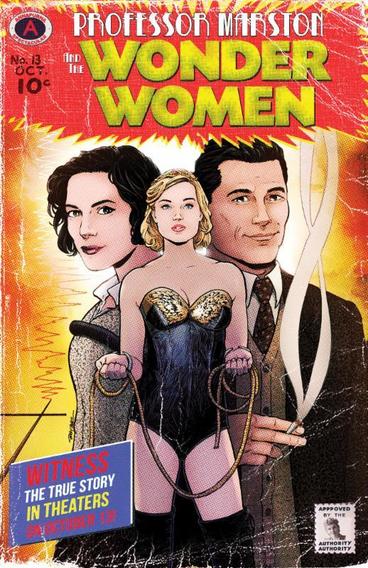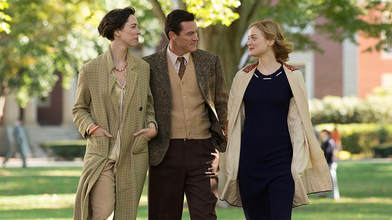Written by Mike Cervantes  It’s that time of the year again, that dismal lull between summer and Thanksgiving where a young geek’s heart is made to…reach like a mother to get his film review column completed. But, something altogether strange yet fortunate happened. This past May, we had an amazing time watching Wonder Woman, the Patty Jenkins-directed, Gal Gadot-starring inspirational first film outing for the comic Amazon, that which gave us a glimmer of hope that some good can come from DC’s Zack Snyder-driven continuity. And some comic book fans acknowledged, as they often do, that the history of the creation of Wonder Woman is just as inspirational a story as the character herself. Therefore, in this gap following the milestone that is Wonder Woman’s first solo theatrical film, we get Professor Marston and the Wonder Women, a biopic from director Angela Robinson, a high-end independent film that delves into the ahead-of-his time college professor whose life circumstances came together to give us one of America’s most inspirational and iconic superheroes, feminine or otherwise. It’s somewhat unfortunate, that the life of an individual, whether or not they receive due billing, gets reduced to a simple punchline. The one involving William Moulton Marston is a rather tongue-and-cheek observation that America’s most prominent female superhero was created by a professor in a polyamorous relationship with two women, which also happened to involve some recreational bondage. In the era of Fredric Wertham’s Seduction of the Innocent, these things were shocking, while in our time that, and a plate of hors d'oeuvres would be considered a fun weekend. But there was a method to Marston’s madness, which this film points out, in addition to pulling the double-duty of giving the two women in his life more than due credit. The film opens in the era of Wertham’s seduction, where Marston, played handsomely by Luke Evans, bears witness to a ritual book burning of his comic creation. We then flashback to his time as a tenured professor, with his equally intelligent and scholarly wife Elizabeth (Rebecca Hall) at his side. When Marston reveals an almost instantaneous attraction to his student, Olive Byrne (Bella Heathcote), Elizabeth feigns a lack of interest, while simultaneously putting Olive into the hot-seat for her husband’s attraction to her. A bit of interplay between the characters ensues, where the trio learns to accept one another against the background of the invention of the polygraph. They make a few attempts to play the world’s game, as Olive is already engaged during her time as Marston’s assistant. But the pot inevitably boils over, and after one last turn on the lie detector, the three share a tryst behind a Greek pillar-bedecked drama classroom, hot enough to melt the cellophane, if this film weren’t produced digitally.  The continued symbolism that would eventually coalesce into the creation Wonder Woman purveys through the film. This not being a Warner Bros. Production, our view of the character is limited to glances at still images from the original comics, particularly during scenes where Marston has to explain the themes of his comics to a hard-nosed parental guardian named Mary (Monica Giordano). And while it may not be wholly accurate to the history of these individuals, the viewer can appreciate it when we see Olive as a sorority house member, with her especially large arm-bracelets in every scene. All of which leads up to a climactic moment wherein the three are participating in a bondage demonstration by Charles Guyette (J.J. Felid) and Olive emerges after an argument between Marston and Elizabeth in a bustier that just SCREAMS Wonder Woman. That gets directly contrasted with Mary’s accusation that Wonder Woman fights crime ‘in a swimsuit.’ Then there’s Marston’s own four-part DISC theory of behavior, the tent-posts of which are written on a blackboard at the beginning of each act, illustrating fully how in all moments, of life, bondage, and creation of fiction, we make this acquiescence. It has the usual flaws that most biopics tend to have. Marston seems enigmatic at times, and is only called out once for using his psychological theories as an excuse to indulge in his own personal fetishes. I also believe that Heathcote’s portrayal of Olive Byrne is a bit askew. She seems like a total innocent in the proceedings, even though it was mentioned once that she’s the niece of a famed feminist. I feel as though, even though the emotions of the cast don’t ring necessarily true, the film makes for a realistic portrayal of the circumstances this group has to go through. And even though Wonder Woman is never brought to the ideological center of this movie, the comic industry is portrayed quite realistically. I personally loved seeing Oliver Platt play famed DC Comics producer Max Gaines, someone clearly duller than the intellectual Marston, still seeing the possibility in his work. If they ever make a biopic about Gaines, I certainly hope that they still keep Platt in the role. Like with all biopics, Professor Marston and the Wonder Women is not an all-in-one clinic of the circumstances a legendary personality has to go through, but as I said in the beginning, the story of Wonder Woman as a whole is pointless without knowing at least a little about her creator, and more particularly, the women in his life who inspired the icon. This is an ideal complement to this summer’s past movie, and it will be interesting to see how much praise the film community will give to either this summer’s brilliant fictional portrayal of Wonder Woman, or this wonderfully down to Earth deconstruction.
1 Comment
11/11/2017 03:15:04 am
Reading your review made me feel that I need to watch this movie if I want myself to be familiar with how Wonder Woman was made. "Professor Marston and the Wonder Women" features a simple story about how a certain man worked hard to come up with a woman who will be ready to save the world! It's not an action film, but it was a movie that focused on the beauty of narration. I love watching simple movies because I don't have to think that much, I just have to watch it!
Reply
Leave a Reply. |
Archives
January 2025
|
|
© 2012-2025, Nerds That Geek LLC.
All Rights Reserved. |
uWeb Hosting by FatCow


 RSS Feed
RSS Feed